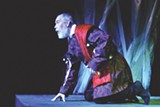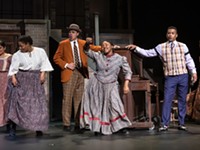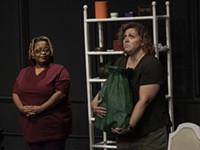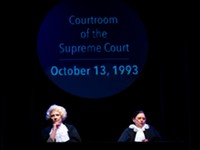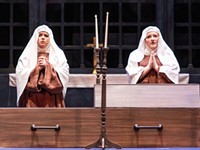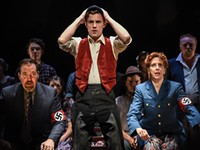[
{
"name": "500x250 Ad",
"insertPoint": "5",
"component": "15667920",
"parentWrapperClass": "",
"requiredCountToDisplay": "1"
}
]
Which of Shakespeare's plays is his greatest? It's a fatuous question, of course, but if I had to choose, I think "King Lear" would be a front-runner. That may be a reflection of growing older: this play has profound and unsettling things to say about aging, physical and mental decline, selfishness, abuse of power, and existence in general.
With its large cast and demanding roles (including a title role that actors generally reserve for the pinnacles of their careers), it's not a play to be undertaken lightly, but the current Shakespeare Players production of "King Lear" at MuCCC is one of the group's best recent productions — strongly cast and intelligently directed.
The story might well have begun, "Once upon a time there was a King named Lear who had three daughters..." But after that beginning things quickly enter fractured fairy tale territory. The aging Lear (Mark Casey) decides to divest his vast kingdom among his three daughters, Goneril (Katherine Sanford), Regan (Stephanie Roosa), and Cordelia (Laura Pratt). Before he does it, he wants each one of them to swear their love for him; Goneril and Regan play along insincerely, but Cordelia, who really does love him, refuses.
Lear marries Cordelia off to the King of France (Bernard Plansky), but the remaining daughters scheme against their father and banish him from his castle, leaving him to wander the countryside with his Fool (Maria Sanguedolce) and another banished nobleman, the Duke of Kent (Matthew D. Moore). In a parallel plot line, the Earl of Gloucester (Bill Alden) turns against his legitimate son Edgar (Brad Craddock), thanks to the scheming of his bastard son Edmund (Tom Bigongiari), who also plans to have his father blinded.
Suffice it to say that none of this ends well, for anyone, and before it ends, Shakespeare shows all too clearly the disastrous results of Lear's precipitous and foolish actions, and the shocking results when a country is overrun by people with more ambition and power than moral sense. (Luckily, that could never happen here.)
With some judicious cuts and rearranging of the script, director John Jaeger produces a "Lear" that not only clocks in at just about three hours (an uncut version could easily take four), but also tells Shakespeare's story with admirable clarity. If you don't think you understand Shakespeare, you might be surprised to discover how easily you can follow this "King Lear." Jaeger also keeps the action moving swiftly, almost precipitously — appropriate for a story set in a kingdom that is falling apart. This production's first act is almost two hours long, but there was no sign of audience fatigue until very close to the end. I knew "King Lear" was an overwhelming tragedy, but this staging reminded me it is also a play of tremendous energy, hurtling ahead in mostly brief scenes.
A lot of the energy, of course, comes from a uniformly good cast, including many Shakespeare Players veterans, working beautifully as an ensemble and presenting Shakespeare's words with great clarity. (Performing in a relatively small space also helps.) Mark Casey does a remarkable job of delineating Lear's mental and physical decline. From his abrupt violence in the first scene to his broken delivery and physical tremors as he descends into illness and madness, he is often scary and, by the end, heartrendingly exhausted. Lear's death is almost a throwaway by Shakespearean standards, but it's still shocking and desolating.
Among the large cast, Maria Sanguedolce's touching, heartsick Fool is especially moving; the sonorous-voiced Bill Alden is equally moving as the deluded Gloucester; and Brad Craddock and Tom Bigongari are effectively contrasted brothers. (When he is impersonating "Mad Tom," Craddock throws himself all over the stage impressively; Bigongari's Edmund doesn't move any more than he has to, which works for this conniving character, one of the baddest bad guys in Shakespeare.) Katherine Sanford and Stephanie Roosa make a pair of cool, not to say chilling, customers as the sisters, and Laura Pratt is a properly reserved Cordelia. I haven't mentioned everyone, but it is definitely a lively company.
Jaeger also designed the "King Lear" set, which turns MuCCC's adaptable black box space into a surprisingly large playing area with a ramp and two levels, which enabled constant activity and changing stage pictures. The backdrop consists of ceiling-to-floor sheets of white plastic twisted, turned, and bunched —effectively austere and lighting-friendly. Jaeger does allow one interesting scenic effect at the beginning of the play, in which strips of red plastic become a canopy.
